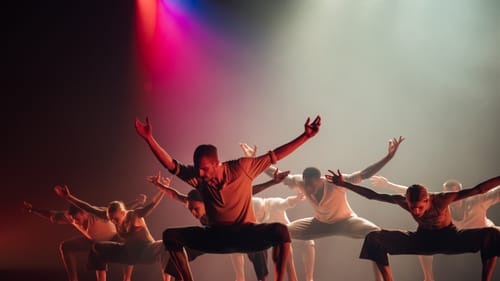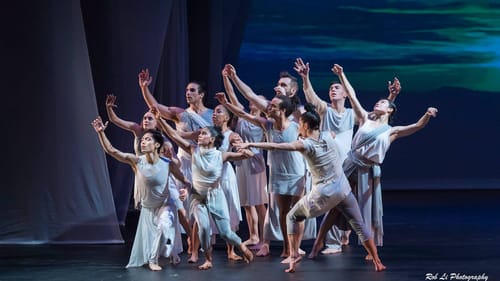Stay in the Loop
BSR publishes on a weekly schedule, with an email newsletter every Wednesday and Thursday morning. There’s no paywall, and subscribing is always free.
Hearts, minds, and bodies
How are Philly dance companies surviving the COVID arts lockdown?

Dance relies on the physical connection between the dancers and sharing that connection with an audience. As Philadelphia flirts with going green, it’s the right time to check in: how are dance companies navigating the age of social distancing, particularly the smaller or midsize ones? How are they surviving the financial losses of canceled performances and curtailed fundraising opportunities? Conversations with Philly’s own Kun-Yang Lin Dancers (KYLD) and Koresh Dance are windows on an extraordinary moment.
Dance on hold
In March, Koresh Dance had just returned from Florida, the first leg of the spring tour, when the news hit. “We came back with such a high,” founder and artistic director Ronen Koresh told me. “We were supposed to travel to California, to Seattle, to Chicago, and they were all canceled.” The company’s home performances scheduled for May at the Suzanne Roberts Theater also fell prey to the lockdown, as did a full slate of dance classes at their studio off Rittenhouse Square.
KYLD lost spring performances at the Mandell Theater. The lockdown also put a halt to classes and the rental of KYLD’s spaces just blocks from the Italian Market, two supplemental income sources the company relied upon. With dance on hold, Koresh Dance and KYLD had to find ways not only to survive financially, but to keep dance alive as an inspiration, and even as a spiritual practice.
Financial stewardship
For KYLD business director Katie Moore, the first order of business was to stop the financial bleeding. KYLD canceled ads that hadn’t run yet for the April performances and negotiated partial payments with some of their collaborators. Organizations like William Penn Foundation and the Samuel S. Fels Fund have committed support, she said, and they are pursuing funding from the Cultural Alliance’s COVID-19 Arts Aid PHL.
“The company cultivates financial stewardship,” she emphasized, so they had a six-month operating reserve. They could pay their dancers through the end of March while they tried to leverage other opportunities. In the meantime, Lin sent an email to his dancers: “It is impossible to go back to work now; we are taking a pause.” For Lin, it became a time to reflect, process, and observe. As the city slowly moves to green status, Lin is making plans for a safe reopening but has set no date.

Koresh secured a federal Paycheck Protection Program loan to pay staff and teachers who moved classes online, but he had to lay off the dancers before the end of their contracts. They understood, he said, and were accommodating because they want the company to survive. Koresh Dance has some grants and is waiting to hear about others; as the director notes, “this government is not very generous to artists.”
For three months, the company offered its dance classes free online, but in June they began asking for between $7 and $15 per lesson. Keila Perez-Vega, who serves as marketing director for both companies, said that the online lessons drew fans across the company’s 30-year history and across the globe. “One of our ballet teachers is from China,” she said. “Now that she is doing virtual offerings, we have people from China taking class.” Koresh hopes to open the studio for in-person classes and rentals on July 6.
Reflect, process, observe
KYLD has posted a few interviews with its dancers online, but it has not sent out a lot of information or content. The phrase “reflect, process, and observe” cropped up often throughout the conversation with BSR. For Lin, dance is a spiritual exercise that brings mindful awareness to the physical expression of the dance. So the moment calls for reflection.
Video is not a sustainable medium for dance, he says, because the dancers need to feel the energy from the audience and the audience needs the energy of the dancers. Still, the company has streamed three full-length productions since the shutdown began, each with special meaning to the company. Santuario is a tribute to the lives lost at the Pulse nightclub; Faith Project/the Door explores spirituality and community.
The most recent, Home/S 9th Street, draws on the immigrant experience: Lin is himself an immigrant. As with the Faith Project, he built the piece around engagement with the community through story circles and it includes spoken excerpts drawn from those dialogues. The presentation served as a virtual benefit to support the Black Lives Matter movement. The company has not yet announced another streaming performance.

For Koresh, as for Lin, it is a time for reflection and healing. “I don’t want to call it spiritual,” he said, “but I think hopefulness, good thoughts, not so much anger, not so much frustration. We will change things with our hearts and with our minds and with our bodies.” And again, he questions, “how do we inspire people even though we cannot get on the stage right now?”
A special occasion
It is Koresh Dance’s 30th anniversary, a time of celebration in the darkness. As part of that celebration, the company streams a full-length work each week on Facebook (it’s also accessible on the company’s website). The most recent piece, Negative Space, presented life on a busy city street. Koresh, too, is an immigrant, and I could hear that influence in the rhythms of the dance. 2007’s Hidden Drive followed in late June. Perez-Vega wants to replicate the experience of the theater. In an online marketplace awash in companies putting their work online, she wants to make tuning in a special occasion.
Both KYLD and Koresh Dance hope to be back in the theater in December, for Koresh’s Come Together Dance Festival. In the meantime, you can find both companies on Facebook. Go for the Monday Meditation, stay for the dancing.
Sign up for our newsletter
All of the week's new articles, all in one place. Sign up for the free weekly BSR newsletters, and don't miss a conversation.

 Camille Bacon-Smith
Camille Bacon-Smith